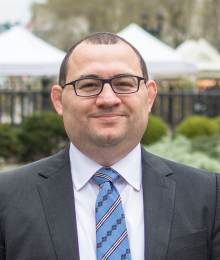S. Outdated Laws & New Technologies in Criminal Legal Practice
Course Information
- Course Number
- L8542
- Curriculum Level
- Upperclass
- Areas of Study
- Criminal Law and Procedure
- Type
- Seminar
- Additional Attributes
- New Course, Experiential Credit
Section 001 Information
Instructor
 Jerome Greco
Lecturer in Law
Jerome Greco
Lecturer in Law
Section Description
As the world increasingly relies on technology, so do criminal defense attorneys and prosecutors. Unlike the legal system, electronic and digital innovation does not move slowly. As a result, courts and attorneys are struggling to apply existing legal precedents and rules to evidence in criminal legal cases derived from the everyday technologies that make up people’s lives. In this course, students will learn about advanced tech that is used by lawyers, investigators, and experts on both sides of criminal legal cases, including in the fields of mobile digital forensics, location tracking, and facial recognition. The legal issues that these tools raise include systemic and individualized racial and gender bias, reasonable expectations of privacy under the Fourth Amendment and beyond, and a lack of scientific reliability under the Frye or Daubert standards.
Upon completion of the course, students will have acquired an understanding in the growing intersection of technology and criminal law, both as it relates to defense and prosecution of criminal cases in courtrooms and broader policy concerns. Students will be able to orally advocate for different positions where there is currently limited on-point case or statutory law. They will be able to take outdated laws and apply them in modern contexts, as well as understanding how the laws need to change.
- School Year & Semester
- January 2024
- Points
- 1
- Method of Evaluation
- Other
- J.D Writing Credit?
- No
Learning Outcomes
- Primary
-
- At the end of the course, students will have acquired understanding of and/or facility in a specific body of law, including major policy concerns
- At the end of the course, students will have acquired understanding of and/or facility in doctrinal analysis, including close reading of cases and precedents, and application to facts
- At the end of the course, students will have acquired understanding of and/or facility in various lawyering skills, for example, oral advocacy, legal writing and drafting, legal research, negotiation, and client communication
Course Limitations
- Instructor Pre-requisites
- None
- Instructor Co-Requisites
- None
- Requires Permission
- No
- Recommended Courses
- It is recommended that students have either experience (minimum 10 weeks) working in the criminal legal system and/or have completed some criminal legal courses in law school.
- Other Limitations
- None